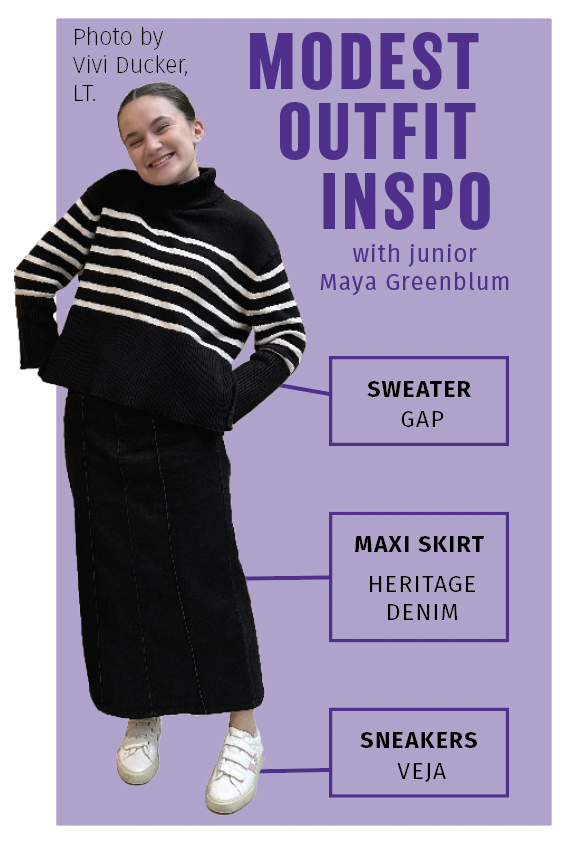Charles E Smith Jewish Day School (JDS)’s core value of pluralism means that its students come from a variety of Jewish denominations, and the school strives to create an environment where all students feel comfortable expressing their Judaism. One way that students do this is by dressing according to tzniut, the Jewish law of modesty. However, not everyone at JDS understands it.
Tzniut is the Talmudic rabbis’ term for modesty. The Chabad website says that females must cover their shoulders, wear skirts past their knees, dress in loosely fitted clothing and cover their hair after marriage. Men are obligated to wear long trousers, long sleeves and a kippah. Practicing tzniut is most common in Orthodox communities, although people practice and interpret modesty in many different ways.
According to Jewish text teacher Rabbi Reuven Slater, the ideology behind dressing modestly is about “understanding that we’re always in the presence of Hashem,” and should dress and act as such. Slater dresses according to tzniut out of respect for his job and the “importance of learning Torah.” In the 25 years he has worked at JDS, he feels that his dress has always been respected by the school community.
“When there’s a discussion about it [tzniut], I feel like it always ends up being in a place of respect, not always, necessarily, but almost always,” Slater said. “I never felt that there’s disdain with regards to tzniut in particular, there might be other areas where people have some issues with Judaism, but I don’t think that I’ve ever felt that anything came from a place of something other than a respectful questioning of it.”
Similarly, junior Malka Lederman feels that the JDS community treats her, who dresses modestly, the same as other students.
“I feel like people don’t really care what other people are wearing,” Lederman said. “I can only think of one person asking me once why I wear skirts every day, and that was from a place of curiosity.”
Junior Maya Greenblum is a lifer at JDS but only started dressing according to tzniut this year, though she had wanted to for some time. She says she has encountered some disrespect from her classmates, which has mainly come in the form of people asking questions that she felt did not come from a place of curiosity. According to Greenblum, these questions and the judgment she received were the cause of her hesitancy to dress modestly consistently before this year.
“When I started wearing skirts at first, some of the comments I got were not necessarily negative, but made me feel a little weird,” Greenblum said. “It felt like I always needed to have a reason to explain myself, and I think it made me feel vulnerable, and I felt more uncomfortable.”
Some of the frequent comments that made Greenblum uncomfortable were questions asked about why she was at JDS instead of a modern Orthodox school, such as Melvin J. Berman Hebrew Academy.
Both Greenblum and Slater believe that the attitude students often have towards tzniut, though sometimes poorly exhibited, ultimately comes from a lack of understanding as to why people choose to dress modestly.
“I think many people in the student body, it’s not that they don’t support it, but they don’t quite understand tzniut,” Greenblum said. “It makes sense because in modern Orthodox schools, girls are taught from a young age about these sorts of things, and that’s not taught here, so people just don’t understand.”
To combat this issue, Slater and Lederman proposed that JDS provide tzniut dressers an opportunity to speak publicly about their decisions to dress the way they do. This could occur in a Judaics class, Kab Shab or during a Wellness Wednesday session.
Greenblum, Lederman and Slater all believe that JDS’ pluralistic environment allows tzniut dressers to feel comfortable, so long as students are polite in their questions. Greenblum does not take issue with people expressing curiosity in tzniut respectfully.
“The negative comments that [I] got are upsetting because I think they’re misunderstanding what pluralism is,” Greenblum said. “Pluralism is accepting all denominations of Judaism, including Orthodoxy. And though I have the choice to go to Berman or another modern Orthodox Jewish day school if I really wanted to go, I choose to go here and to be in this pluralistic community.”
This story was originally published on The Lion’s Tale on March 25, 2025.




































